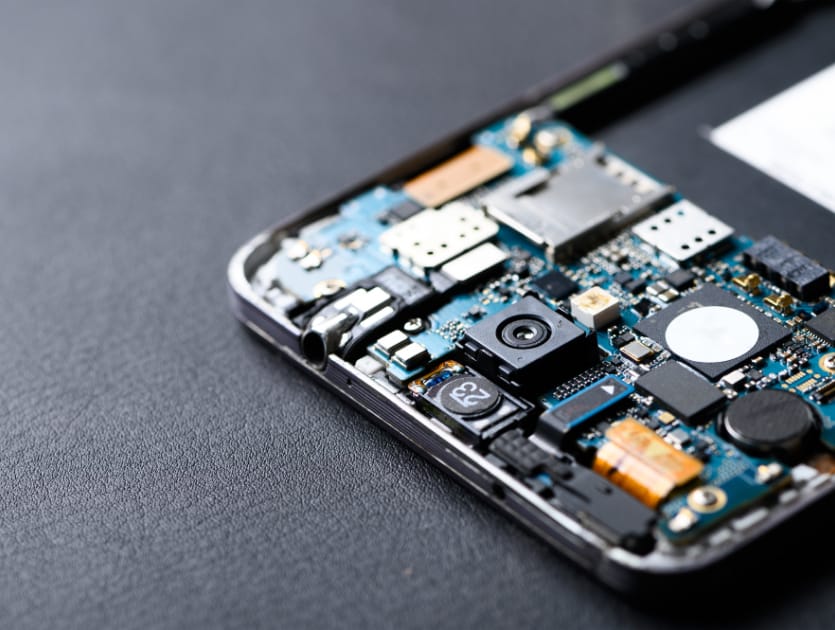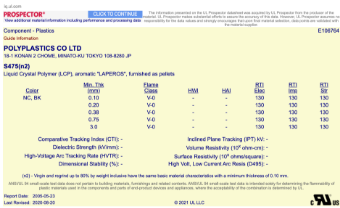
LAPEROS®LCP Additional UL Certification for
Grade S475
Providing essential product quality even
at a recycled material usage rate of 80%
Related SDGs





Providing essential product quality even
at a recycled material usage rate of 80%
Related SDGs



To meet our customers’ needs to ensure effective resource utilization, Polyplastics has secured additional UL certification*1for Grade S475 of LAPEROS®LCP which verifies the fact that its quality (physical properties) at a recycled material usage rate of 80% is equivalent to that of a product made from virgin materials (i.e., a product containing no recycled materials).
*1A third-party product safety/environmental assessment organization’s UL certification attesting to conformity with North American product safety requirements

Characterized by its thinness and high flowability, LAPEROS®is the prime example of a super engineering plastic. It boasts superior heat resistance and the unusual property of greater mechanical strength the thinner it is, as well as high dimensional precision. Due to these properties, it is frequently used in the
ultra-miniature precision connectors found in mobile tablets, smartphones and other cutting-edge IT devices that are being made increasingly smaller.
Normally, when molding these connectors, they must be attached to sprues and runners, but, once they are molded, these attachments are thrown away. As the size of the products being
manufactured grows smaller, the percentage of sprues and runners gets higher, causing a problem of more waste.
With society becoming increasingly concerned about the needs for more effective utilization of resources, our LAPEROS customers expressed a desire to use their sprues and runners as a recyclable resource that can make up to
80% of the resin content used in product molding.

High temperatures and shearing forces (forces applied to the materials when performing mixing and high-speed injection) are applied to the sprues and runners during the molding process. The use of recycled materials might have an impact on material quality. To meet the customers’ request, we had to check and certify the quality would not be
affected by the use of recycled materials.
Thus, we set out to obtain additional UL certification showing that the quality (physical properties) at a recycled material usage rate of 80% is equivalent to that of a product made from virgin materials.
Before applying to the UL for this additional certification, we needed to confirm for
ourselves, in-house, whether or not the quality required for certification could be achieved at a recycled material usage rate of 80%.
We first performed molding using virgin materials, after which we manufactured recycled materials. Prescribed amounts of recycled and virgin materials were mixed together and molded to make the test
pieces. They were subjected to testing to see whether its physical properties held up as well as a test piece made of 100% virgin materials.
In-house testing

Application to UL

The process of obtaining certification for the recycled materials, which first required the creation of recycled materials, and then the comparison of test pieces results with those of virgin materials, was much more involved than the certification process for just the virgin materials.
In the end, we were able to obtain additional
UL certification of S475 as capable of achieving required product quality, even at a recycled material usage rate of 80%.

Yellow Card*3(UL certification documentation)
*2The figure above is a conceptual drawing of the general certification process; the actual process may vary from that shown.
*3The information shown was the information current as of January 27, 2021. The pictured image is a trademark of UL LLC. The latest Yellow Card information can be foundhere. (User registration is required to view Product iQ.)
After certification, regular audits for our products are conducted by UL auditors. If UL auditors make additional requests, test pieces are produced to submit to the UL laboratory. In order to maintain certification, these test pieces must pass the testing inspection at the UL laboratory.
Society’s expectations with regard to effective resource utilization will only continue to go higher. From the standpoint of product quality assurance, using virgin materials is easier and more certain. However, in order to meet the needs of customers and, by extension, society with regard to effective resource utilization, we will need to
offer resins that incorporate an even greater proportion of recycled materials while reliably ensuring a high level of product quality.
Moving forward, we will, as the No. 1 engineering plastic solutions provider, actively pursue further certifications and seek to develop and propose new products that can realize both effective resource
utilization and reliable product quality for a sustainable and abundant future for society.
